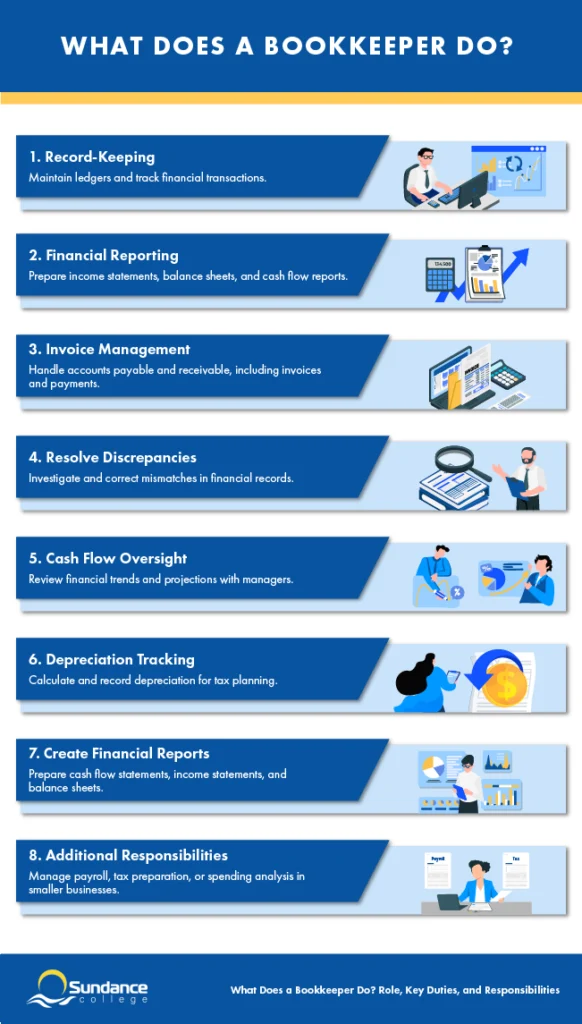Blog / What Does a Bookkeeper Do? Role, Key Duties, and Responsibilities
What Does a Bookkeeper Do? Role, Key Duties, and Responsibilities

Accounting, Tax, and Payroll Diploma
- Accounting Assistant/Technician
- Bookkeeper
- Income Tax Return Preparer
- Payroll Administrator
Table of Contents
In any business, big or small, someone has to keep track of every sale, purchase, and payment. Bookkeepers manage these tasks by organizing financial transactions and maintaining detailed records for future reference. This helps businesses stay compliant with regulations, monitor every dollar, and make informed financial decisions.
To get a better understanding of bookkeeping responsibilities, let’s explore what a bookkeeper is and what their role involves.
Listen to: What Does a Bookkeeper Do? Role, Key Duties, and Responsibilities
What is a Bookkeeper?
A bookkeeper is a professional who records a business’s financial transactions, such as sales, purchases, payments, and receipts. By categorizing these transactions, they maintain accurate financial records, helping businesses comply with regulations and make strategic decisions.
Bookkeeping has a long history, originating in ancient civilizations with records kept on clay tablets. Over time, it has become a specialized profession focused on documenting every dollar that enters or leaves a business. Unlike accountants, who interpret financial data and manage complex tax matters, bookkeepers focus on the day-to-day recording of a business’s financial activities, providing clarity and transparency.
Day-to-Day Work of a Bookkeeper
The daily duties of a bookkeeper revolve around keeping financial records organized and up to date. They record transactions, maintain ledgers, manage invoices, track payments, and reconcile accounts to resolve any discrepancies. The scope of their work often depends on the size and type of business.
In smaller businesses, bookkeepers may handle broader responsibilities, such as processing payroll or assisting with tax preparation. In larger companies, their roles tend to be more specialized, focusing on areas like accounts payable or accounts receivable.
The industry in which they work also plays a role in influencing a bookkeeper’s tasks. For example, bookkeepers in retail might track inventory, while those in nonprofits often monitor grants and donations.
Key Duties and Responsibilities of a Bookkeeper

Bookkeepers are essential for keeping finances organized and supporting business operations. Here’s an overview of their key responsibilities to help you understand their role:
1. Maintaining Ledgers
Bookkeepers record financial transactions in ledgers, noting details like dates, amounts, purposes, and bank accounts. These records serve as the foundation for financial reporting.
2. Preparing Financial Statements
Using ledger data, bookkeepers compile weekly, monthly, quarterly, and annual statements to provide insights into profit, expenses, and cash flow.
3. Managing Invoices
Bookkeepers oversee accounts receivable and payable by creating invoices, tracking customer payments, and handling company bills.
4. Resolving Bank Discrepancies
When discrepancies arise between bank statements and bookkeeping records, bookkeepers investigate and resolve them, maintaining financial accuracy.
5. Discussing Cash Flow
Bookkeepers regularly meet with managers to review financial trends, recurring expenses, and forecasted income.
6. Calculating Depreciation
They record and manage asset depreciation to optimize tax planning and maintain financial control.
7. Creating Financial Reports
Bookkeepers prepare critical reports, including:
- Income Statements: To summarize revenue and expenses over a specific period.
- Balance Sheets: To provide a snapshot of the company’s financial standing.
- Cash Flow Statements: To track the movement of cash in and out of the business.
8. Handling Additional Financial Tasks
In smaller businesses, bookkeepers may prepare tax returns, calculate payroll, or analyze spending patterns to support operations.
These responsibilities support financial organization and provide actionable insights for decision-making.
Skills Required for Bookkeeping

Successful bookkeepers rely on a combination of key financial skills and soft skills to maintain accurate records and support business goals. This includes:
- Accounting Knowledge:
Bookkeepers apply accounting principles to manage transactions, inventory, cash, receivables, and non-current assets in both merchandising and service industries.Ashley, a graduate of Sundance College, shared how her prior experience in payroll and taxes was strengthened by the Accounting, Tax, and Payroll diploma program.
She said, “Before starting the program, I was already working with payroll and taxes, handling invoicing and paying bills. Sundance helped me refine these skills and gave me a deeper understanding of how accounting, payroll, and tax processes affect a business’s financial operations.“
- Accounting Software Expertise:
Proficiency in tools like QuickBooks and Excel for managing transactions and reports.Carmila, another graduate of the Accounting, Tax, and Payroll program, found the skills gained from Excel directly applicable to her work.
She shared, “I learned and enjoyed taking the Excel course. It has been very helpful with my current job and business.”
- Ethical Conduct:
Honesty and confidentiality in managing sensitive financial data. - Attention to Detail:
Accurate documentation and review of transactions help avoid errors and maintain financial consistency across records. - Problem-Solving Ability:
Identifying and addressing discrepancies supports consistent financial operations and business stability. - Time Management:
Balancing responsibilities such as payroll, invoicing, and financial reporting requires strategic planning and disciplined scheduling - Communication Skills:
Translate numbers into actionable insights, helping teams and management make informed decisions on budgeting and strategy.

Bookkeepers manage financial records, track transactions, prepare reports, and resolve discrepancies to support business operations. Their expertise in accounting and attention to detail help businesses make informed decisions and maintain financial consistency.
Whether you’re starting out or looking to expand your skills, Sundance College’s Accounting, Tax, and Payroll Diploma provides a strong foundation in bookkeeping, payroll, and tax preparation.
As Tamara, a graduate, mentioned, “I’ve always enjoyed working on data entry and payroll tasks. Sundance expanded on what I was already doing, so it felt like the perfect next step.”
Like Tamara, you can take the next step in your career by speaking with an admissions advisor today.
Related Blogs
Subscribe for more career advice
Blog Categories
Share on:
